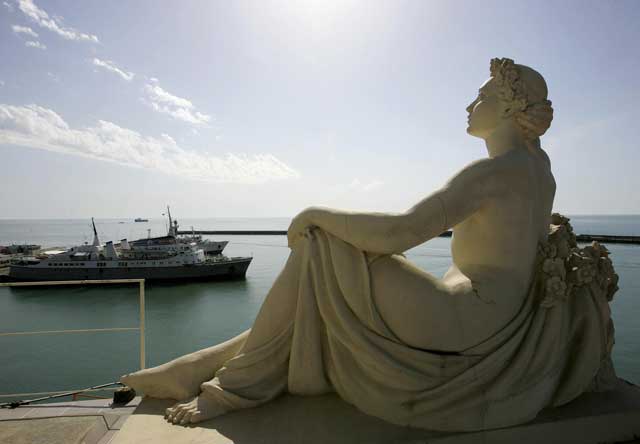Let Our Fame Be Great, By Oliver Bullough

Your support helps us to tell the story
From reproductive rights to climate change to Big Tech, The Independent is on the ground when the story is developing. Whether it's investigating the financials of Elon Musk's pro-Trump PAC or producing our latest documentary, 'The A Word', which shines a light on the American women fighting for reproductive rights, we know how important it is to parse out the facts from the messaging.
At such a critical moment in US history, we need reporters on the ground. Your donation allows us to keep sending journalists to speak to both sides of the story.
The Independent is trusted by Americans across the entire political spectrum. And unlike many other quality news outlets, we choose not to lock Americans out of our reporting and analysis with paywalls. We believe quality journalism should be available to everyone, paid for by those who can afford it.
Your support makes all the difference.Oliver Bullough's title quotes a prayer of the Narts, mythical ancestors of the Caucasus tribes. They thirsted for a short, glorious life, rather than a long one spent in comfortable obscurity, but were denied both options. This remarkable book shows how their descendants have been similarly - though infinitely more cruelly - cursed.
Bullough takes us to a village near the Black Sea resort of Sochi where the Winter Olympics will be held in 2014, and observes that on this spot in 1864 the Russian army completed its genocide of the local Circassian tribe. "What if one of the candidates to host the Olympic Games had been Auschwitz-Birkenau?' asked a group from the Circassian diaspora (getting no reply from the IOC).
Who now knows about the Circassians? Airbrushed out of existence by the Tsars, then by the Soviets, now by Putin's state, they are one of several forgotten groups whose tangled histories Bullough devotedly chronicles.
Who knows about the Nogais, the Karachais, the Balkars? Trawling through archives, tracking their exiled descendants across the Middle East and Central Asia, Bullough builds up a picture of each tribe in turn, delineating the sweetly egalitarian agrarian societies which have been erased. Some survivors, notably the Circassians in Israel, have put down roots in exile, while earlier generations of Circassians made good in Amman by helping found that city.
But these are rare points of light in a dark cycle of oppression, resistance, and genocide, which began in the 18th century and is still being viciously repeated.
It all began when Catherine the Great built a highway through the mountains to her Christian friends in Georgia. Her gambit provoked a reaction from which today's Chechens still draw inspiration: a shepherd named Sheikh Mansur, who led the resistance to this imperialist push, was pictured prominently on Chechen president Dzhokar Dudayev's wall when he was eyeballing Boris Yeltsin in the 1990s.
Dismissed as the leader of "bandits", Mansur was caught and imprisoned, but he taught the Russians not to underestimate "the people of the mountain". And his call for a return to a purified Islam was echoed by his great successor Imam Shamil, who kept the Russian army at bay for 20 humiliating years in the mid-19th century, before being defeated and imprisoned in turn.
Exemplary executions and the massacre of villages became the Russians' standard tactic when less draconian measures failed. The first recorded use of the term "ethnic cleansing" was by a Russian minister in 1856.
Descendants of the Balkars, Karachais, Chechens and Ingush whom Stalin massacred or deported are now being treated as something far lower than second-class citizens after their return "home". In Moscow, dark-skinned Muslims from the Caucasus are stigmatised as "black", and often denied basic civil rights.
Chechnya may now be in the limelight, but the sufferings of those who live in the rest of what Russia laughably terms its "autonomous" Caucasus regions have gone largely unreported. Hence the significance of this powerfully-written book. As a Reuters reporter, Bullough covered the Moscow theatre siege and the Beslan massacre, and was first on the scene after suicide-bombings in Moscow. But what makes this account unique is the narrative he extracts from the fine detail of Russian court reports, and (over lashings of vodka) from his initially mistrustful interviewees.
It's a revelation to hear the circumstances behind Zarema Muzhakoyeva's aborted bid to explode herself, along with dozens of diners, in a Moscow café: her life-story is so bleak, as Bullough observes, as almost to defy comprehension. The same applies to Nurpashi Kulayev, the one convicted hostage-taker to survive the Beslan atrocity. Bullough argues convincingly that he was innocent. The savagery of the Cherek massacre in 1942, when a valley-full of women and children were hunted down and butchered, is pieced together through jaw-dropping first-hand accounts. The blame for this is still being laid at the Nazis' door, rather than its Soviet perpetrators'.
Meanwhile, for those who want to understand how a happy, industrious, and law-abiding 18-year-old can be turned by the present Russian state into a physical and psychological cripple dedicated to the jihad cause, the story of Rasul Kudayev - a mountain Turk who couldn't afford the necessary bribe to land a job in the Russian police force - will fit the bill. All this may be happening in Europe, but Europe - desperate not to offend Vladimir Putin - is resolutely turning a blind eye.
Michael Church's field-recording CD 'Songs of Defiance: music of Chechnya and the North Caucasus' is on the Topic label
Join our commenting forum
Join thought-provoking conversations, follow other Independent readers and see their replies
Comments